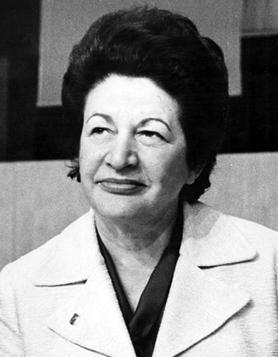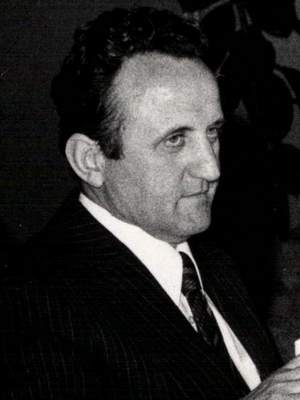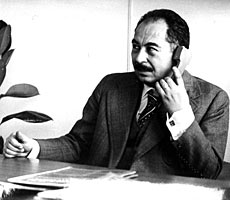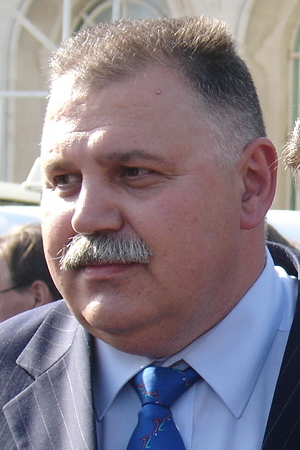Serbo-Croatian pronunciation: [mîkaʃpîʎak] or [-ʃpîʎaːk] ; 28 November 1916 – 18 May 2007) was a Croatian politician who spent most of his political career as a member of the League of Communists of Yugoslavia in the SFR Yugoslavia. He served as President of the Presidency of Yugoslavia from 1983 to 1984 and was also Prime Minister of Yugoslavia from 1967 to 1969.
Contents
Špiljak was previously President of the Executive Council of SR Croatia from 1963 to 1967. He was also President of the League of Communists of Croatia from 1984 to 1986.
Early years
He was born in Odra Sisačka (part of Sisak), in the Kingdom of Croatia-Slavonia (present-day Croatia). His father Dragutin was a railway worker. Špiljak began working at the age of 16. He joined the Communist Party in 1938 and fought with Partisans during World War II.
Career
From 1949 to 1950, he was the mayor of Zagreb.
In 1963, Špiljak was appointed the Chairman of the Executive Council of Croatia and served until his 1967 appointment as the President of the Federal Executive Council, Yugoslavia's Prime Minister. He served in that capacity until 1969.
Špiljak then served as President of the collective Presidency of Yugoslavia from 1983 until 1984. While holding this office, Špiljak opened the 1984 Winter Olympics.
He was subsequently elected President of the Central Committee of the League of Communists of Croatia from 1984 until 1986.
Death
He died in 2007 at the age of 90. [1] He was cremated in Zagreb. [2]
In the 2000s (decade), German courts linked Špiljak to the assassination of Croatian emigrant Stjepan Đureković in 1983. [3] After the hearings in Germany, all the links connecting him to the assassination were dropped.
Related Research Articles

League of Communists of Croatia was the Croatian branch of the League of Communists of Yugoslavia (SKJ). It came into power in 1945. Until 1952, it was known as Communist Party of Croatia. The party dissolved in 1990.

Ivan Ribar was a Croatian politician who served in several governments of various forms in Yugoslavia. Ideologically a Yugoslavist and communist, he was a prominent member of the Yugoslav Partisans, the resistance movement to the Nazi occupation of Yugoslavia.

Milka Planinc was a Croatian communist politician who served as Prime Minister of Yugoslavia from 1982 to 1986. She was the first and only woman to hold this office. Planinc was also the first female head of government of a diplomatically recognized socialist state in Europe.

Ante Marković was a Croatian and Yugoslav politician, businessman and engineer. He is most notable for having served as the last Prime Minister of Yugoslavia from 1989 to 1991.

The Socialist Republic of Bosnia and Herzegovina, commonly referred to as Socialist Bosnia or simply Bosnia, was one of the six constituent federal states forming the Socialist Federal Republic of Yugoslavia. It was a predecessor of the modern-day Bosnia and Herzegovina, existing between 1945 and 1992, under a number of different formal names, including Democratic Bosnia and Herzegovina (1943–1946) and People's Republic of Bosnia and Herzegovina (1946–1963).

The prime minister of Yugoslavia was the head of government of the Yugoslav state, from the creation of the Kingdom of Serbs, Croats and Slovenes in 1918 until the breakup of the Socialist Federal Republic of Yugoslavia in 1992.

Veselin Đuranović was a Yugoslav communist politician who served as President of the Presidency of Yugoslavia from 1984 to 1985. He also served as President of the Presidency of SR Montenegro from 1982 to 1983. Đuranović previously succeeded Džemal Bijedić as Prime Minister of Yugoslavia in 1977 following his death, serving until 1982.

Marko Orlandić was a high-ranking Montenegrin politician in the Socialist Federal Republic of Yugoslavia (SFRY) during the 1970s and '80s. He was born in Seoca, Yugoslavia.

The Socialist Republic of Serbia, previously known as the People's Republic of Serbia, commonly abbreviated as Republic of Serbia or simply Serbia, was one of the six constituent republics of the Socialist Federal Republic of Yugoslavia in what is now the modern day states of Serbia and the disputed territory of Kosovo. Its formation was initiated in 1941, and achieved in 1944–1946, when it was established as a federated republic within Yugoslavia. In that form, it lasted until the constitutional reforms from 1990 to 1992, when it was reconstituted, as the Republic of Serbia within the Federal Republic of Yugoslavia. It was the largest constituent republic of Yugoslavia, in terms of population and territory. Its capital, Belgrade, was also the federal capital of Yugoslavia.
Stane Dolanc was a Slovenian communist politician during SFR Yugoslavia. Dolanc was one of president Josip Broz Tito's closest collaborators and one of the most influential people in Yugoslav federal politics in the 1970s and 1980s. He was secretary of the Executive Bureau of the Presidency of the Central Committee (CC) of the League of Communists of Yugoslavia (LCY) from 1971 to 1978, federal Secretary of the Interior from 1982 to 1984 and a member of the Presidency of Yugoslavia from 1984 to 1989. He was regularly appointed a member of the Federal Council for Protection of the Constitutional Order and was chairing the body in late 1980s.

Petar Stambolić was a Yugoslav-born Serbian communist politician who served as the President of the Federal Executive Council of Yugoslavia from 1963 to 1967 and as President of the Presidency from 1982 until 1983.

The Presidency of the Socialist Federal Republic of Yugoslavia was the collective head of state of the Socialist Federal Republic of Yugoslavia. It was established in 1971 according to amendments to the 1963 Constitution and reorganized by the 1974 Constitution. Up to 1974, the Presidency had 23 members – three from each republic, two from each autonomous province and President Josip Broz Tito. In 1974 the Presidency was reduced to 9 members – one from each republic and autonomous province and, until 1988, President of the League of Communists of Yugoslavia ex officio.

Stjepan Đureković was a Croatian political dissident and businessman who was assassinated by the Yugoslavian State Security Administration (UDBA) in West Germany in 1983. He was previously the CEO of the state-owned INA petrol company. In 1982, he defected to West Germany and became active in Croatian émigré circles opposed to Yugoslavia.

Ivan Šuker was a Croatian politician and economist. He served as Minister of Finance from 2003 to 2010, as a member of the Croatian Democratic Union.

Jure Bilić was a Yugoslav communist politician.

Josip Vrhovec was a Yugoslav and Croatian communist official, best known for serving as Yugoslav Minister of Foreign Affairs between 1978 and 1982, and the Chairman of the League of Communists of Croatia (SKH) from 1982 to 1984.

The office of leader of the League of Communists of Yugoslavia (LCY) was first established on 23 April 1919 under the name "Secretary of the Central Committee". However, in reality, power in this period was shared in a collective leadership with the "Technical Secretary of the Central Committee". When the office of political secretary changed its name on 8 December 1936 to "General Secretary of the Central Committee", the position became more powerful. It kept that name until its abolishment on 4 October 1966, when it was replaced by the "President of the Central Committee". This office lasted until 15 March 1969, when it was replaced by the office of the president of the LCY. Upon the death of Josip Broz Tito, the office of president of the LCY Central Committee was replaced with the "President of the Presidency of the LCY Central Committee". This office lasted a decade. With several branches having already left the LCY, the remaining members of the Central Committee of the 13th Congress established the office of "Coordinator of the Presidency of the Central Committee" on 23 May 1990. Three days later, on 26 May, the 14th Congress reconvened and elected a provisional leadership, with the leader holding the office of "Chairman of the Committee for the Preparation of the Congress of Democratic and Programmatic Renewal of the Central Committee". For most of its existence, the officeholder was the de facto leader of the Socialist Federal Republic of Yugoslavia.

The president was the leader of the League of Communists of Bosnia and Herzegovina (LCBM), the ruling party of the Socialist Republic of Bosnia and Herzegovina (SRBM) in the Socialist Federal Republic of Yugoslavia. Party rules stipulated that the LCBM Central Committee elected the president. Moreover, the Central Committee was empowered to remove the president. The president served ex officio as a member of the Presidency of the Central Committee of the League of Communists of Yugoslavia (LCY) and of the SRBM Presidency. To be eligible to serve, the president had to be a member of the Presidency of the LCBM Central Committee. The 8th LCBM Congress instituted a two-year term limits for officeholders.

Ratomir "Rato" Dugonjić was a Yugoslav Partisan fighter in the antifascist liberation struggle of the people of Yugoslavia, Minister in the Communist Government, Ambassador with the Non-Aligned Movement, president of the Socialist Republic of Bosnia and Herzegovina and the Vice president of the Socialist Federal Republic of Yugoslavia. Dugonjić was a member of the Politburo Central Committee, League of Communists of Bosnia and Herzegovina and a member of the Central Committee of the League of Communists of Yugoslavia of the Fifth to Eighth Congress and member of the Presidium of the Central Committee. He was a member of the Presidency of Yugoslavia and Federation Council.
The Socialist Republic of Croatia, one of the constituent countries of the Socialist Federal Republic of Yugoslavia had gone through a number of phases in its political life, during which its major political characteristics changed - its name, its top level leadership and ultimately its political organization.
References
External links
- Klasić, Hrvoje (2019). Mika Špiljak, revolucionar i državnik (in Croatian). Naklada Ljevak. ISBN 9789533553177.
Mika Špiljak | |
|---|---|
 Špiljak in 1984 | |
| 5th President of the Presidency of Yugoslavia | |
| In office 15 May 1983 –15 May 1984 |
Succession boxes | |
|---|---|


